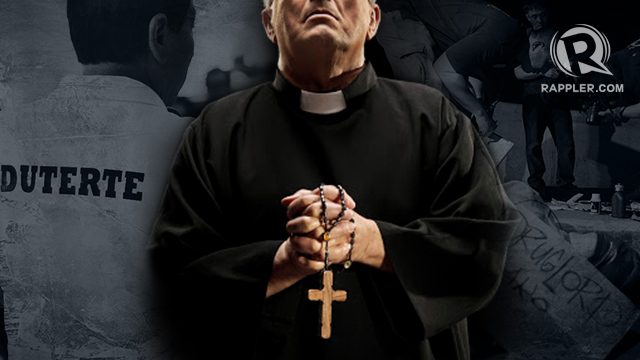SUMMARY
This is AI generated summarization, which may have errors. For context, always refer to the full article.
![[Newspoint] Default by timidity](https://www.rappler.com/tachyon/r3-assets/612F469A6EA84F6BAE882D2B94A4B421/img/D50E797189D44466921883A2E35102A0/vergel-santos-headshot-150px.jpg)
Once a bold swing force in Philippines politics, the Catholic Church has been approaching Rodrigo Duterte’s presidency with inordinate caution. Why, and for how long can it continue to do that?
An elemental conflict definitely exists between them, especially over Duterte’s war on drugs. It may have provoked remarks from the religious, but these were made by individual Churchmen, and not in any fashion that may be taken as institutional – say, some statement from the Catholic Bishops’ Conference of the Philippines (CBCP), the Church’s policy center.
The remarks, furthermore, betray a lack of readiness to take on the President, not even on such a fundamental and urgent moral question as the taking of lives possibly by shortcutting the rule of law. Just over three months into his six-year presidency, Duterte’s war has already left more than 2,000 drug dealers and addicts dead, mostly from among the poor (other counts put the number closer to 4,000).
International rights organizations and some Western governments have themselves taken Duterte to task for it – President Barrack Obama and Secretary General Ban Ki Moon no less for the United States and for the United Nations, respectively. The latest to follow suit has been the chief prosecutor of the International Criminal Court of Justice, Fatou Bensouda. He professes to be “deeply concerned” about the killings and that “statements from high [Philippine] officials . . . seem to condone such killings.”
With the Philippine Church, the case would seem more default than anything else – default by timidity. For instance, the statement from the Archbishop Emeritus of Duterte’s native Davao City, Fernando Capalla, sounds on the order more of advice than of protest – and a rather vague and roundabout one, too; he simply asks Duterte to “listen to the people . . . the poor people.” Archbishop Oscar Cruz’s own remark is maybe as sharp as they come: “If you kill . . . no matter how righteous you are, that is not acceptable.”
On the other hand, Duterte, not one to observe any sense of proportion or propriety, particularly with detractors, hits back and calls the church “the most hypocritical institution” and accuses “many” priests of “corruption” and “sexual misconduct,” thus quieting them.
Actually, from the start, the Church has more or less left Duterte alone. In fact when Manila Archbishop Luis Antonio Cardinal Tagle called on him on the occasion of his presidential ascension, they both looked relaxed, even cheery. Tagle appeared to have put behind him the one moment of infamy that had marred Pope Francis’s Philippine visit. Duterte had remarked, with, as is his wont, a profane interjection, that all the Pope did was tangle up Manila’s traffic, upsetting his own electoral-campaign schedule.
This is supposed to be the same Church that only a generation ago, in 1986, drew world praise when it led a popular revolt by street protest and prayer that ended the 14-year dictatorship of Ferdinand Marcos. But that, too, had taken so long that, in the meantime, impatient clergymen had decided to support the anti-Marcos forces on their own, some of them going underground even.

Force the hand of the Church
Marcos may not be comparable with Duterte in many senses – for one thing, where Marcos was calculating and deliberate, Duterte tends to act on impulse – but where they are alike happens to be in the most worrisome sense – Duterte has Marcos’s authoritarian streak.
At any rate, circumstances seem to be now conspiring to force the hand of the Church. Two objects of Duterte’s consuming ire have come under its auspices. One is Edgar Matobato, a whistleblower who has told a Senate inquiry stories of murder set in Davao City during Duterte’s 22-year mayoralty. His testimony, given in fair detail and looking, at least on the face of it, firsthand, indicts Duterte for “death squad” justice, an allegation that has not really stopped hounding him. (READ: Who brought Matobato out in the light)
Edgar Matobato says he was himself a member of that death squad, and has been in fear for his life since he quit a couple of years ago. He has found sanctuary with the Church, an arrangement it has openly acknowledged.
The other is oppositionist Senator Leila de Lima, who, as once chairperson of the Commission on Human Rights, investigated Duterte on the same accusations, and is now seen to champion Matobato. She herself has come under the Church’s protection; in perhaps the first congregational act of protest against Duterte, a special mass has been said honoring and reassuring her.
But, officially, the CBCP remains itself uncommitted. Possibly it is held back by these considerations: First, given his volatility and express idolatry of Marcos, Duterte may well be the most dangerous leader since him he somehow intimidates the Church, which has its own vulnerabilities; second, Duterte has himself the support of some prelates, some right inside cbcp, and Christian-based sub-sects and groups; third, the latest polls have given his leadership a 76-percent approval.
But it’s those things, too, that raise fears of a descent into authoritarianism that could catch the Church and everyone else unprepared and come, as De Lima herself warns, in a form “more scary” than we’ve seen. The “real threat,” she says, is a revolutionary government. It can happen with one presidential proclamation, unlike martial law, which, she points out, has “to go through some legal obstacles [like] getting the concurrence of Congress” and “is also subject to review . . . by the Supreme Court.”
In the whole self-clarifying scheme of things, the Church is nagged by the same question as in the time of Marcos: What’s keeping it? – Rappler.com
Add a comment
How does this make you feel?
There are no comments yet. Add your comment to start the conversation.